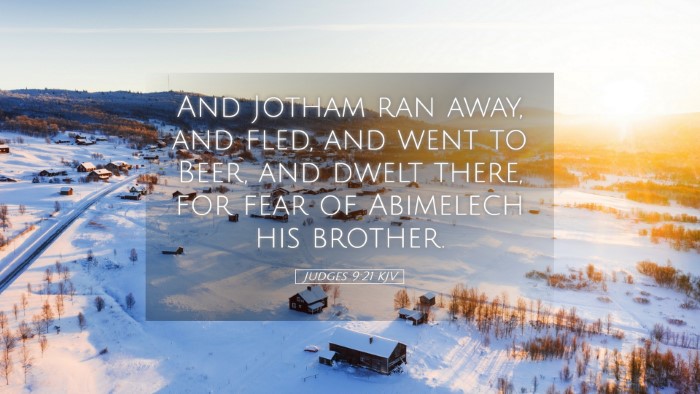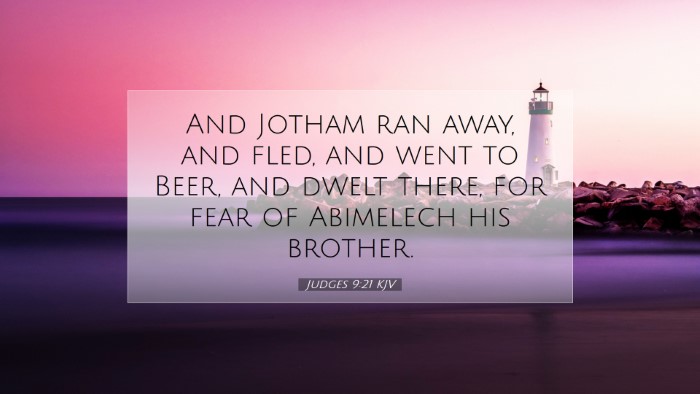Commentary on Judges 9:21
Judges 9:21 states: "And Jotham ran away and fled, and went to Beer, and dwelt there, for fear of Abimelech his brother."
Contextual Background
Judges 9 narrates the rise of Abimelech, son of Gideon, who sought power after his father's death. This chapter highlights the themes of tyranny, the consequences of ambition, and the sovereignty of God amidst human actions. Jotham, the youngest son of Gideon, escapes the death that Abimelech has orchestrated against his brothers, showcasing both personal survival instincts and prophetic undertakings.
Analysis of the Verse
In this verse, several elements require examination:
- Jotham's Flight: The act of fleeing indicates a natural response to danger and persecution. Jotham's decision to escape embodies a moment of survival essential for his role in the narrative.
- Location of Beer: Beer signifies a retreat, perhaps a place of refuge, suggesting that sometimes wisdom lies in avoiding confrontation when one is outmatched. This location also serves as a reminder of the geographical context of the Israelite narrative, emphasizing its significance in the larger division of the land of Canaan.
- Fear of Abimelech: Jotham's fear underscores the threat posed by his brother. Abimelech’s ambition reveals the destructive potential of power struggles within families and tribes.
Theological Reflections
This verse is laden with theological implications:
- The Sovereignty of God: Throughout the book of Judges, God's providence is evident even amidst chaos. Jotham's escape indicates divine protection over the righteous remnants of Israel.
- Human Frailty: Jotham's flight symbolizes the vulnerability of humanity in the face of evil. Even a leader's son feels the need to flee, demonstrating that fear can grip even the most noble among us.
- The Consequences of Sin: The violent actions of Abimelech lead to a narrative where consequences ripple through the society. Jotham's survival becomes a precursor to his prophetic declaration against Abimelech.
Historical and Cultural Insights
Abimelech’s usurpation of power is not merely a personal tragedy but reflects a broader commentary on leadership and governance within Ancient Israel. This event prompts one to consider the divine prohibition against kingship and the desire of Israel to be governed by God's law, reflecting their unique covenant relationship with Yahweh.
Commentary from Public Domain Sources
Matthew Henry: Henry emphasizes the moral lessons in Jotham's escape. He highlights that circumstances often compel individuals to act with prudence and foresight, and the escape into Beer symbolizes a godly wisdom in times of distress.
Albert Barnes: Barnes notes that this flight represents not only self-preservation but also the beginning of a larger purpose. He expresses that Jotham is not simply fleeing out of fear but preparing to fulfill a significant role as the remnant who will speak against Abimelech's tyranny.
Adam Clarke: Clarke elaborates on the implications of Jotham’s actions. He notes the importance of Beer as a place of refuge within a turbulent national context. Clarke's insights remind readers of the distinction between godly leaders and those who seize power for selfish ends, highlighting Jotham's vital role in returning to the community to pronounce judgment.
Conclusion
Judges 9:21 encapsulates a critical moment in the narrative of Israel’s tumultuous history. The themes of fear, survival, and prophetic voice intertwine to offer essential lessons for modern audiences. From pastoral care to scholarly analysis, this verse serves as a reminder of the eternal struggle between good and evil, the role of godly wisdom in adversity, and the sovereignty of God who preserves His chosen even when all seems lost. Jotham's flight is not just a historical footnote but a precursor to hope and redemption amidst human failure.


